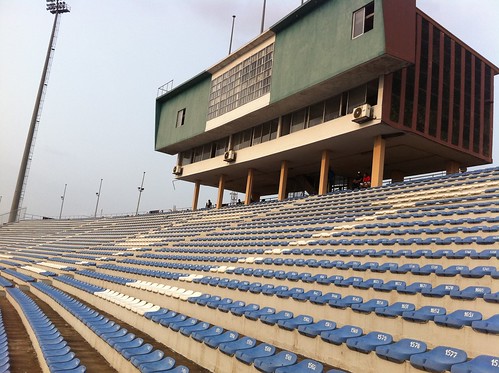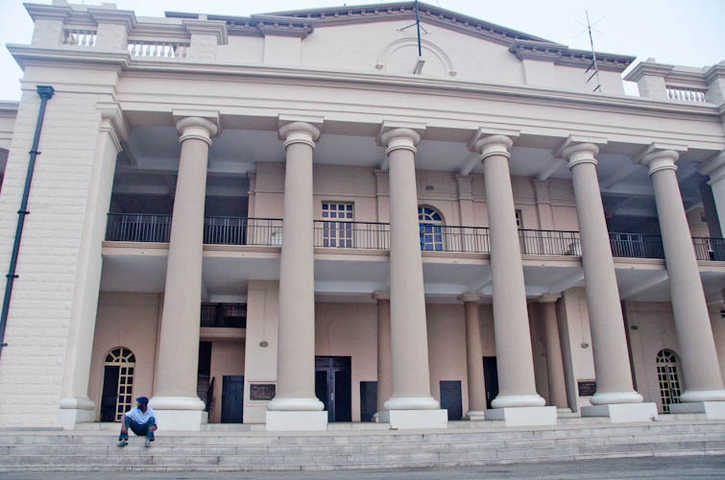Pictures Of Ibadan In The 60s (from Skyscraper City) - Politics (4) - Nairaland
Nairaland Forum / Nairaland / General / Politics / Pictures Of Ibadan In The 60s (from Skyscraper City) (34138 Views)
Aisha Buhari Visits The Olubadan Of Ibadan In His Palace. Pic / Throwback Photo Of Bukola Saraki & His Dad In The 60s / Nigeria In The 60s/70s. Sights And Sounds (2) (3) (4)
(1) (2) (3) (4) (5) (6) (7) (8) (Reply) (Go Down)
| Re: Pictures Of Ibadan In The 60s (from Skyscraper City) by eaglechild: 6:57pm On Aug 31, 2013 |
agbameta:The Liberty Stadium now renamed Obafemi Awolowo Stadium is a historic 25,000 seat football stadium based in the city of Ibadan, Nigeria. It was the first stadium to be built in Africa. Ibadan also boasts of the first radio and television stations in Africa. The first live broadcast was from Ibadan by Madam Anike Agbaje- Williams the first face on television in Africa. Why are u pple fond of laying bogus claims. What do you mean by first stadium built in Africa? Pls Africa does not span from Adoekiti to Oshogbo. There are much older stadia in Egypt, etc. First face on which television?! Next you'll tell me Ekiti has the highest number of professors in Nigeria. I was enjoying the pictures of shoeless folks on shorts trekking about till u came and spoilt it with your claims 3 Likes |
| Re: Pictures Of Ibadan In The 60s (from Skyscraper City) by primeson1(m): 9:33pm On Aug 31, 2013 |
http://en.m.wikipedia.org/wiki/List_of_television_stations_in_Africa visit here dude and c for yourself that Nta Ibadan is the first in Africa and even Galaxy TV is the first privatley registered station.in.Nigeria and first to broadcast. That's y Oyo state slogan is "pace setter " |
| Re: Pictures Of Ibadan In The 60s (from Skyscraper City) by primeson1(m): 9:39pm On Aug 31, 2013 |
eaglechild: Liberty Stadium , the first stadium in Africa. The first citadel of higher learning, University of Ibadan (formerly the University College of Ibadan), and the first teaching hospital in Nigeria, University College Hospital , UCH, were both built in this ancient but, highly important city. Ibadan is also home to the legendary Shooting Stars FC -- a professional Football Club. source: http://www.world66.com/africa/nigeria/ibadan |
| Re: Pictures Of Ibadan In The 60s (from Skyscraper City) by naptu2: 9:50pm On Aug 31, 2013 |
NTA Ibadan (Established in 1959 as Western Nigeria Television [WNTV] Ibadan) "Africa's first television station" http://en.m.wikipedia.org/wiki/List_of_television_stations_in_Africa |
| Re: Pictures Of Ibadan In The 60s (from Skyscraper City) by naptu2: 10:19pm On Aug 31, 2013 |
[size=14pt]Cocoa House ( "First skyscraper in Africa" )[/size] Cocoa House is owned by the Odua Group of Companies. This 26 storey building was commissioned in 1965. It was the tallest building in tropical Africa when it was commissioned. It was built from proceeds of commodities (particularly cocoa) that were sold by the Western Region. Cocoa House became the 2nd tallest building in Nigeria when NECOM House was commissioned in 1979. The building was significantly damaged in a fire in 1985, but was rehabilitated and reopened in 1992. [img]http://1.bp..com/-L15WVFxeyNE/T6iFKbjp4EI/AAAAAAAAA8o/2jrC5rFHjqc/s400/Cocoa+House+Ibadan.jpg[/img]  |
| Re: Pictures Of Ibadan In The 60s (from Skyscraper City) by naptu2: 10:26pm On Aug 31, 2013 |
Kingsway Department Stores Ibadan at christmas time in the 1970s. 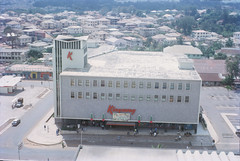 |
| Re: Pictures Of Ibadan In The 60s (from Skyscraper City) by agbameta: 10:29pm On Aug 31, 2013 |
ba7man: That's still no excuse for him/her to always display his/her daftness with such alarming consistency. I truly understand, but you need to know from what hate and bitterness well he drinks from just like the rest f his sad and pathetic kinsmen. |
| Re: Pictures Of Ibadan In The 60s (from Skyscraper City) by naptu2: 10:50pm On Aug 31, 2013 |
| Re: Pictures Of Ibadan In The 60s (from Skyscraper City) by Nobody: 10:54pm On Aug 31, 2013 |
U guys shud keep fooling urselves,,,thinking u re deceiving us |
| Re: Pictures Of Ibadan In The 60s (from Skyscraper City) by agbameta: 10:57pm On Aug 31, 2013 |
naptu2: Mapo Hall Beautiful architecture and great historical landmark.. |
| Re: Pictures Of Ibadan In The 60s (from Skyscraper City) by Eledan: 11:05pm On Aug 31, 2013 |
naptu2: Mapo Hall I was a very young boy the first time I entered the hall....I was there for a wedding but was throughly enamored with the architectural masterpiece that I was inside that I completely forgot why I was there..  |
| Re: Pictures Of Ibadan In The 60s (from Skyscraper City) by TheBookWorm: 11:06pm On Aug 31, 2013 |
There was a country... Does this mean Nigeria has regressed? |
| Re: Pictures Of Ibadan In The 60s (from Skyscraper City) by Nobody: 11:06pm On Aug 31, 2013 |
eaglechild: Yes, liberty stadium is the first modern stadium built in Africa. The list of first is almost endless. The first hotel in Nigeria is the "premier" hotel Ibadan. If you no like am knack head for wall. 1 Like |
| Re: Pictures Of Ibadan In The 60s (from Skyscraper City) by Nobody: 11:21pm On Aug 31, 2013 |
TheBookWorm: There was a country... Nigeria and some of the newly industrialized countries in Asia were at the same level of development in 1960. |
| Re: Pictures Of Ibadan In The 60s (from Skyscraper City) by Seempliehuman(m): 2:21am On Sep 01, 2013 |
I'll stop yabbing my frnd frm Ibadan after this. It seems ogun state is taking the place of Ibadan in today's Nigeria.i'll put up an article from 'the nation' abt it |
| Re: Pictures Of Ibadan In The 60s (from Skyscraper City) by agbameta: 5:00am On Sep 01, 2013 |
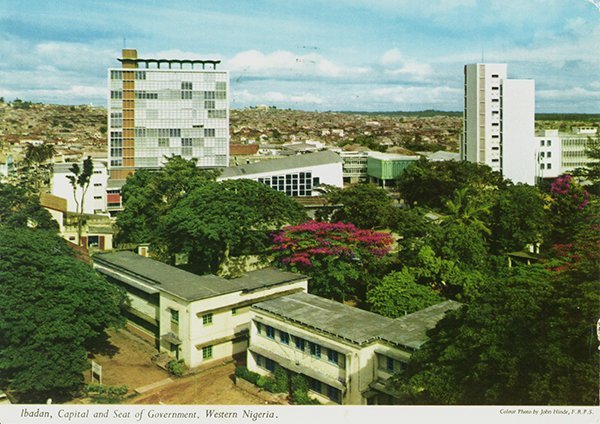 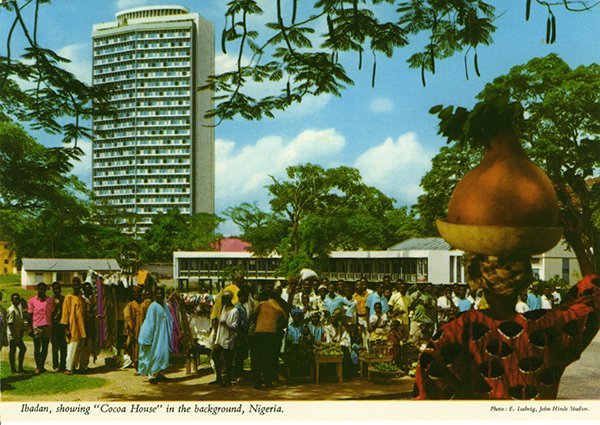 1 Like |
| Re: Pictures Of Ibadan In The 60s (from Skyscraper City) by agbameta: 5:04am On Sep 01, 2013 |
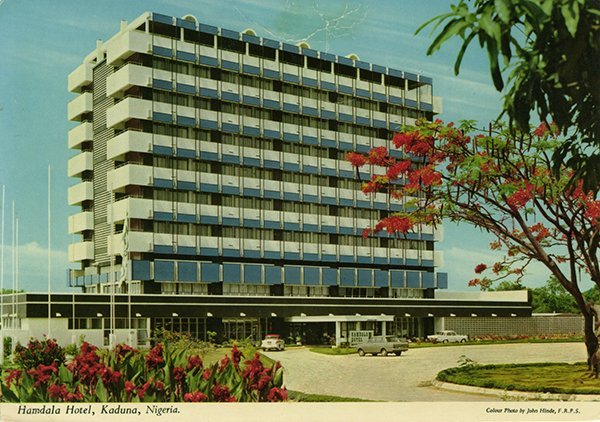 The north was shinning with their groundnut pyramid funds too.. I wonder what was going on in the east back then....nothing obviously.. 1 Like |
| Re: Pictures Of Ibadan In The 60s (from Skyscraper City) by naptu2: 5:12am On Sep 01, 2013 |
[img]http://2.bp..com/-oaDH6S9oZ2Y/UW4xV6ASb4I/AAAAAAAAiYU/hHsKjUVp5jw/s400/first+tv+woman+africa.jpg[/img] Anike Agbaje-Williams: A Broadcaster, The first person, male or female to appear on Television in the whole of Africa. This was at WNTV-WNBS Ibadan on 31 October 1959. WNTV was later taken over by the Federal Military Government (when state governments were banned from owning broadcast stations) and is now NTA Ibadan. I watched a beautiful interview she granted in 2009 (that was done to celebrate 50 years of television in Nigeria). She never missed a day of work and was broadcasting even when she was pregnant. |
| Re: Pictures Of Ibadan In The 60s (from Skyscraper City) by agbameta: 5:13am On Sep 01, 2013 |
 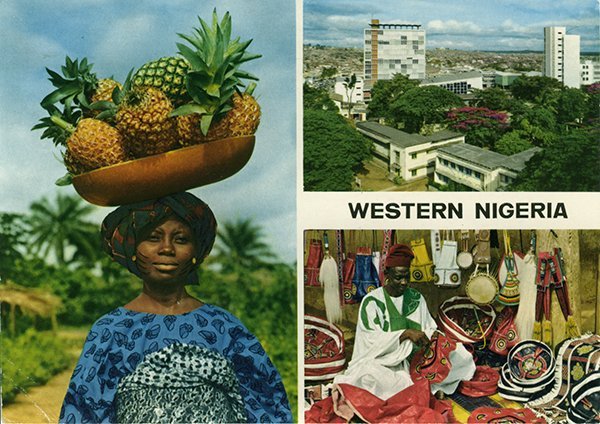 |
| Re: Pictures Of Ibadan In The 60s (from Skyscraper City) by agbameta: 5:15am On Sep 01, 2013 |
naptu2: [img]http://2.bp..com/-oaDH6S9oZ2Y/UW4xV6ASb4I/AAAAAAAAiYU/hHsKjUVp5jw/s400/first+tv+woman+africa.jpg[/img] That's deep, very very deep. Very wonderful history we have... |
| Re: Pictures Of Ibadan In The 60s (from Skyscraper City) by agbameta: 5:19am On Sep 01, 2013 |
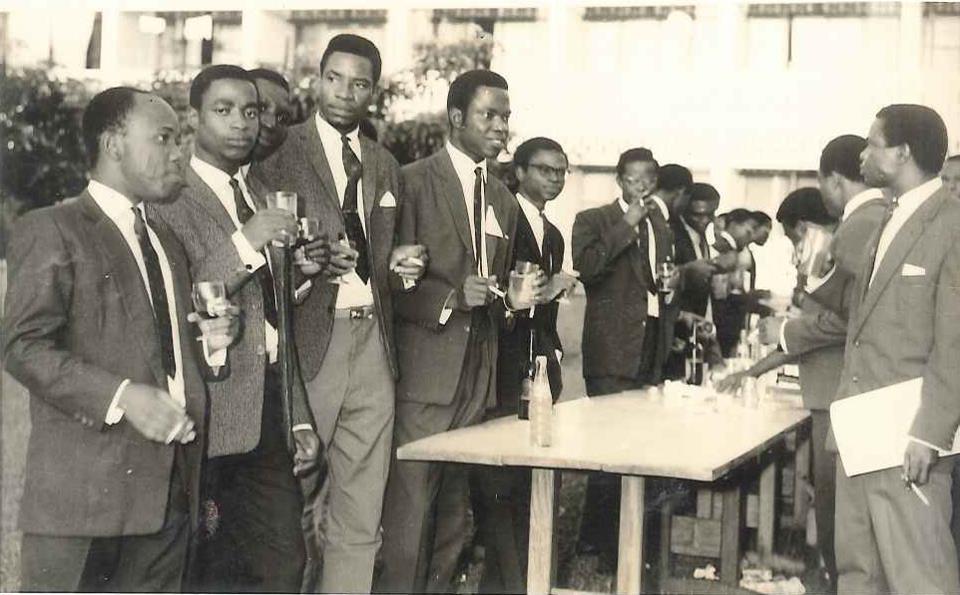 A social gathering of Sigma Chi at the University of Ibadan. When students were gentlemen. Ibadan did got a bad rap for real. . |
| Re: Pictures Of Ibadan In The 60s (from Skyscraper City) by agbameta: 5:29am On Sep 01, 2013 |
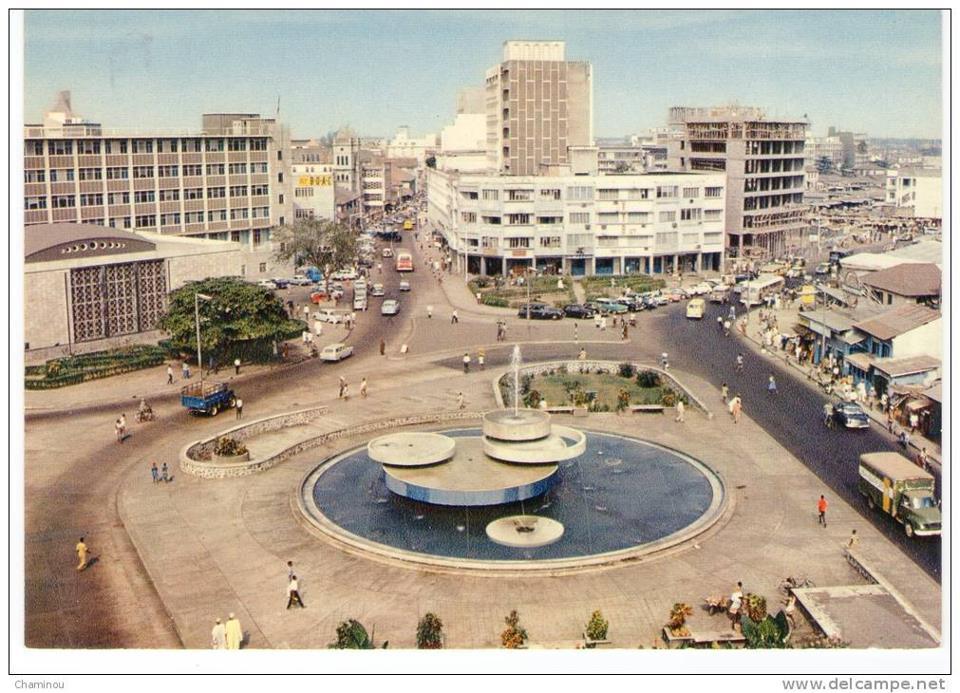 |
| Re: Pictures Of Ibadan In The 60s (from Skyscraper City) by agbameta: 5:31am On Sep 01, 2013 |
 Thank God we are regaining and walking our way back to greatness.. |
| Re: Pictures Of Ibadan In The 60s (from Skyscraper City) by agbameta: 5:37am On Sep 01, 2013 |
[img]http://1.bp..com/-ye9aKjrrx2U/TsdTYwui8NI/AAAAAAAAAfc/1L-pWAdZDHs/s1600/Baba+THE+ASSIZES+COURT+TINUBU+SQUARE+LAGOS%252CBUILT+1906%252CDEMOLISHED+1960%2529.jpg[/img] The Assizes Courts of West Africa, Tinubu Square, Lagos, built in 1906, demolished in 1960. |
| Re: Pictures Of Ibadan In The 60s (from Skyscraper City) by naptu2: 5:37am On Sep 01, 2013 |
Leyland (Ibadan), like all the other auto factories that were set up in the 1970s (Pan, Von, Anamco, Steyr, etc), stopped producing because of the economic decline in the 1980s. It was subsequently taken over by a local company (Eba Odan Commercial & Industrial Company Limited) and is back in business. This is their website. http://leylandng.com/ |
| Re: Pictures Of Ibadan In The 60s (from Skyscraper City) by naptu2: 5:41am On Sep 01, 2013 |
agbameta: [img]http://1.bp..com/-ye9aKjrrx2U/TsdTYwui8NI/AAAAAAAAAfc/1L-pWAdZDHs/s1600/Baba+THE+ASSIZES+COURT+TINUBU+SQUARE+LAGOS%252CBUILT+1906%252CDEMOLISHED+1960%2529.jpg[/img] That was the Supreme Court of Nigeria. Wole Soyinka was furious when it was demolished (he even wrote about it). According to him, it was a beautiful building, made of wood, that was perfect for the African climate. It was demolished and a European looking building was built at Igbosere to replace it. An unnecessary fountain (the Independence Fountain at Tinubu Square) was erected where the building once stood. 1 Like |
| Re: Pictures Of Ibadan In The 60s (from Skyscraper City) by naptu2: 6:12am On Sep 01, 2013 |
[size=14pt]In 1960, Ibadan was the centre of music not Lagos –Orlando.[/size] http://nationalmirroronline.net/index.php/entertainment/52853.html
|
| Re: Pictures Of Ibadan In The 60s (from Skyscraper City) by AdmYamamoto: 6:26am On Sep 01, 2013 |
naptu2: Leyland (Ibadan), like all the other auto factories that were set up in the 1970s (Pan, Von, Anamco, Steyr, etc), stopped producing because of the economic decline in the 1980s. It was subsequently taken over by a local company (Eba Odan Commercial & Industrial Company Limited) and is back in business. This is their website. These are the companies Lagos, Oyo, Ondo, Osun, Ekiti and Ogun State should be empowering by patronizing them and all Nigerians indeed should be patronizing Leyland! They are located in Ibadan, in the SW employing our citizens and natives. They should be well encouraged. The company should also make inroads into the Northern part of Nigeria, MB, ND and lastly the SE. They should make every effort to take advantage of the huge markets West of Africa, which is huge! |
| Re: Pictures Of Ibadan In The 60s (from Skyscraper City) by Godson201333(m): 6:49am On Sep 01, 2013 |
Lovely pictures.....Looks like people were suffering then cos alot of those kids weren't wearing flip-flop. |
| Re: Pictures Of Ibadan In The 60s (from Skyscraper City) by RedReact: 6:52am On Sep 01, 2013 |
1966 marked the beginning of downward spiral of growth in Nigeria in its totality, but I still believed that we were not ready for independence when we got it. If Nigeria's independence came after the order of SA, we wont be where we are today; although kudos should be given to our fathers who fought for the independence of the nation. Not only did they fight, but also had vision for a great country that would thrive and compete with other countries in the world. What a pity that we have less visionaries in Nigeria today! The country has great potentials to be greater than the 60s era, and I believe a great Nigeria will be seen again, but we need servant-leader politicians and not pocket-focused politicians, that have docked our political terrain today. God bless Nigeria and she will be great again. |
| Re: Pictures Of Ibadan In The 60s (from Skyscraper City) by Nobody: 6:58am On Sep 01, 2013 |
Population explosion is one of the major sources of the woes we're now facing. Everry tomfool just goes about shooting spermatozoa all over the place at the slightest opportunity - without a source of decent livelihood or a plan on how to cater for the resultant offsprings. Wetin one poor man dey carry 5-6 children do? We need to find a way to regulate this abeg, otherwise things would get even worse. Nigeria's population was about 40m in the 1960s (much of which resided in the rural areas by the way). . . . compare that to the current 200m-plus population, and you would begin to realise where the problem lies. 2 Likes |
| Re: Pictures Of Ibadan In The 60s (from Skyscraper City) by Nobody: 8:47am On Sep 01, 2013 |
Nigeria is not the only country with population explosion, yet other countries still managed to progress. Stop making excuses. Our problem was / is corruption. pro01: Population explosion is one of the major sources of the woes we're now facing. Everry tomfool just goes about shooting spermatozoa all over the place at the slightest opportunity - without a source of decent livelihood or a plan on how to cater for the resultant offsprings. Wetin one poor man dey carry 5-6 children do? We need to find a way to regulate this abeg, otherwise things would get even worse. |
(1) (2) (3) (4) (5) (6) (7) (8) (Reply)
ICPC Recovers 40 Cars From Ex-Directors Of Federal Ministry Of Water Resources(p / Arabic Script On Naira Notes: Culture Clash Over Nigeria's Rival Alphabets / Anyim Pius Anyim Arrested By EFCC In Abuja
(Go Up)
| Sections: politics (1) business autos (1) jobs (1) career education (1) romance computers phones travel sports fashion health religion celebs tv-movies music-radio literature webmasters programming techmarket Links: (1) (2) (3) (4) (5) (6) (7) (8) (9) (10) Nairaland - Copyright © 2005 - 2024 Oluwaseun Osewa. All rights reserved. See How To Advertise. 95 |
